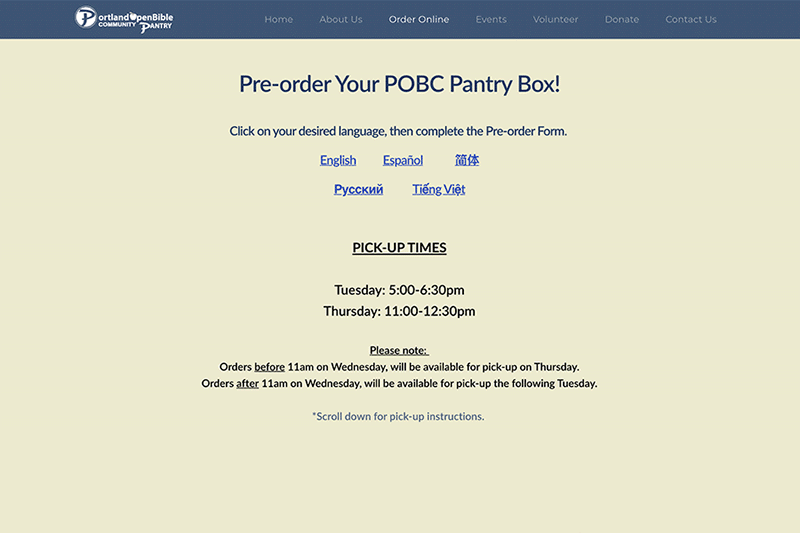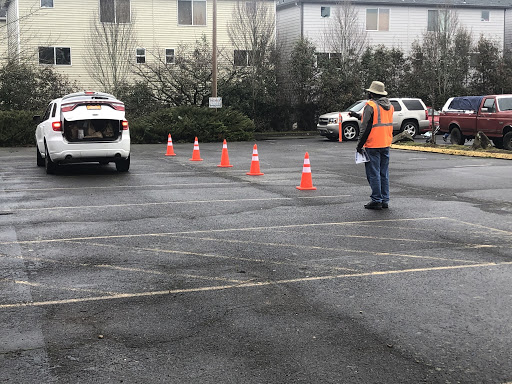Portland Open Bible Launches Online Food Assistance Orders
Portland Open Bible Launches Online Food Assistance Orders

In March 2020, over 1,300 pantries and distribution sites across the state rushed to make changes to keep our communities safe from COVID-19. Overnight, pantries overhauled distribution models to accommodate social distancing and the increased need for food assistance. For many, this meant making the tough decision to shut down shopping-style pantries and provide pre-packaged food boxes instead.
Faced with these difficult decisions, Portland Open Bible Community Pantry in SE Portland changed its distribution to a drive-thru model to accommodate social distancing. They knew they had to find a way to keep clients, volunteers, and staff safe. But they also didn’t want the community to have to sacrifice one of the most important parts of receiving food assistance — autonomy.
Portland Open Bible Community Pantry has always believed clients seeking resources have a right to decide what they need. “We really believe in people having choice,” says Executive Director Betty Brown.
As COVID-19 case counts rose and it became clear that pantries would be operating in these new models for longer than anyone expected, Betty and her team reflected on ways to improve their drive-thru distribution system. How could they continue to provide a safe distribution experience year-round?
“I’m a nurse by trade,” says Betty. “And I’m thinking COVID, I’m thinking pneumonia, I’m thinking influenza. I’m thinking all the different respiratory diseases that affect 66 years and older, because 66% of our people who come are the elderly.” Betty did not want to increase the risk of any disease to her community by making people wait in the cold. Someone on her team suggested pre-packaged food boxes. But they agreed they couldn’t put together one food box that would meet the cultural and dietary needs of the whole community. That conversation sparked an idea for Betty’s son, Aaron Brown, who coordinates the drive-thru pantry.
Together, they envisioned an online ordering program that would allow people to customize the contents of their food box and eliminate wait times during pickup. Luckily, Aaron knew just the person to help them make this idea a reality. An online ordering system was built with the help of a longtime friend who just so happened to be an online subscription service developer.
“If you go to the page, you see English, you see Vietnamese, Russian, Cantonese. You click on your language and we’ll ask you all your core information, stuff they would actually ask you at the pantry,” says Aaron. “After they do that it’ll just give a list. Produce – what produce do you want? And then they could check it. What kind of dairy products do you want? They just check it. It’s really simple.”

Image courtesy of Portland Open Bible
Courtney Wright, Senior Network Food Strategist at Oregon Food Bank, has worked closely with Portland Open Bible throughout the process. “We’re thrilled with this new online ordering platform for several reasons. First, it’s translated into several languages, giving more people access to this resource. The ability to make choices for your diet and culturally specific food needs is also so important. I’m also excited to see how we can scale this platform to other pantries as we learn from the successes at Portland Open Bible Community Pantry,” says Courtney.
Once an order is placed Aaron receives an email with the order and he passes on the information to volunteers to prepare it. “We’ve grown every single week to more and more clients, and I think it’s because we were able to cater to so many communities with so many different languages,” says Aaron.
The recruitment process for the online ordering system was just like the information process for their distribution – word of mouth. Aaron himself made sure community members were aware of the program and if they were ever hesitant, he’d walk them through the online order process on his phone.
“I think that the way we’re doing online ordering, instead of just giving people boxes – it makes people happy. You’re really thinking about them as an individual,” says Betty. “We want to show the respect that we believe everybody deserves and part of showing that respect is to give them what their family’s going to use.”